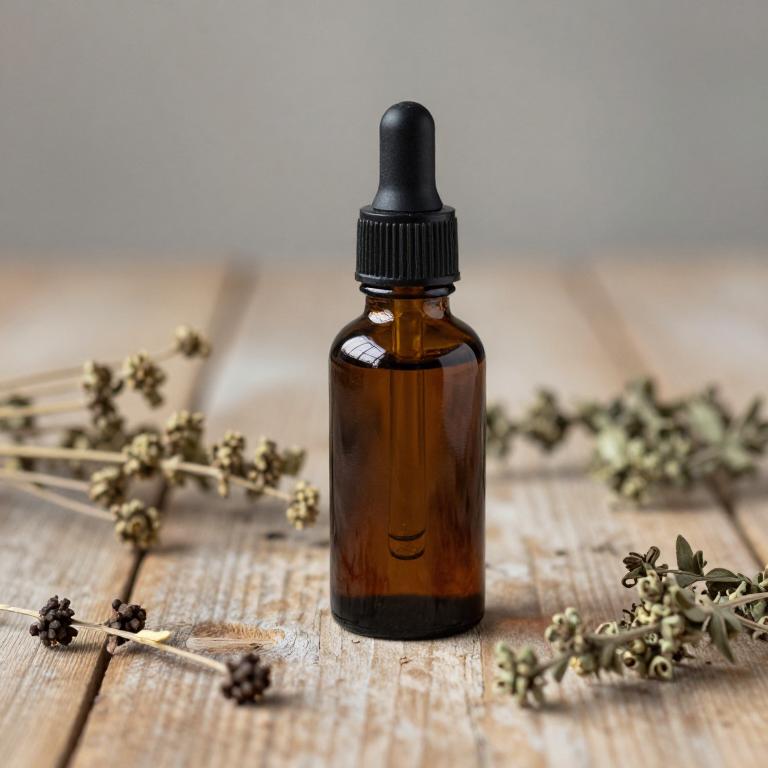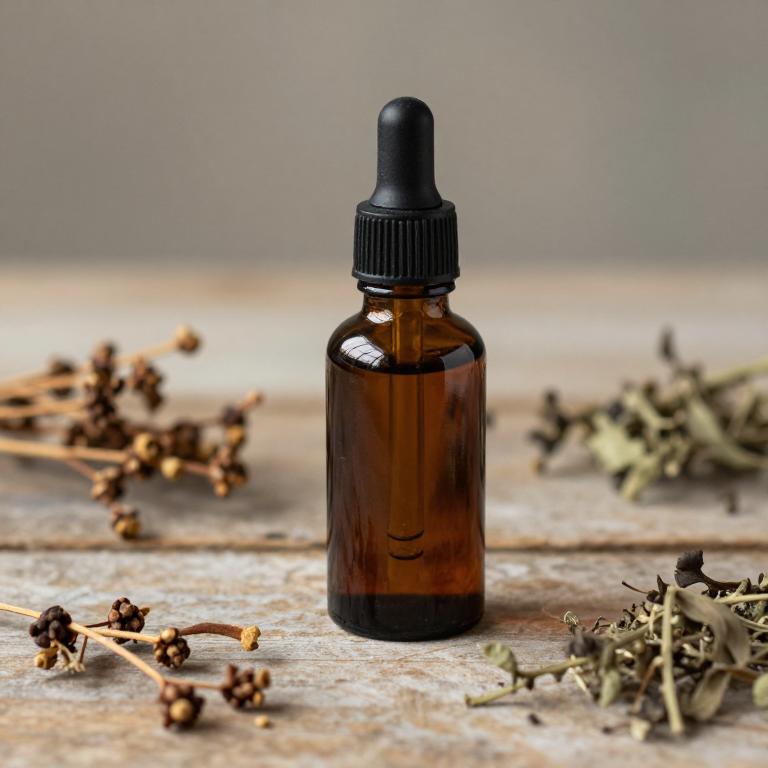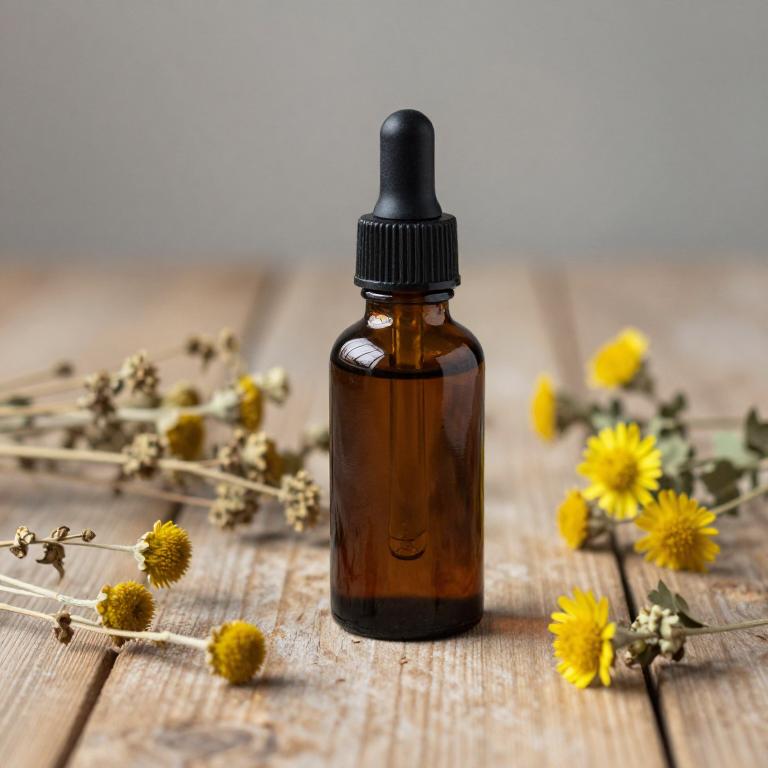10 Best Herbal Tinctures For Inflamed Gums

Herbal tinctures have gained popularity as natural remedies for inflamed gums due to their soothing and antimicrobial properties.
Commonly used herbs such as echinacea, goldenseal, and myrrh are known for their ability to reduce inflammation and fight bacterial infections in the mouth. These tinctures can be applied directly to the gums using a cotton swab or diluted with water to create a mouth rinse, offering a convenient and targeted approach to oral care. They are often preferred by individuals seeking alternatives to conventional medications, especially those with sensitivities or a preference for holistic treatments.
However, it is important to consult with a healthcare provider before use to ensure safety and effectiveness, particularly for those with existing medical conditions or who are pregnant.
Table of Contents
- 1. Salvia (Salvia officinalis)
- 2. St. john's wort (Hypericum perforatum)
- 3. Yarrow (Achillea millefolium)
- 4. Marigold (Calendula officinalis)
- 5. Echinacea (Echinacea purpurea)
- 6. Stinging nettle (Urtica dioica)
- 7. Oregano (Origanum vulgare)
- 8. Bloodroot (Sanguinaria canadensis)
- 9. Rosemary (Rosmarinus officinalis)
- 10. German chamomile (Chamomilla recutita)
1. Salvia (Salvia officinalis)

Salvia officinalis, commonly known as sage, has been traditionally used for its anti-inflammatory and antimicrobial properties, making it a valuable ingredient in herbal tinctures for inflamed gums.
These tinctures often combine sage with other soothing herbs like chamomile or echinacea to enhance their therapeutic effects. When applied topically or used in mouth rinses, sage tinctures can help reduce gum swelling, redness, and bacterial buildup that contribute to inflammation. The active compounds in sage, such as rosmarinic acid and flavonoids, work to soothe irritated tissues and promote healing.
As a natural alternative to conventional treatments, salvia officinalis tinctures offer a gentle yet effective approach to managing gum inflammation.
2. St. john's wort (Hypericum perforatum)

Hypericum perforatum, commonly known as St. John's Wort, is a herbal plant that has been traditionally used for its anti-inflammatory and antimicrobial properties.
When prepared as a tincture, it can be applied topically to inflamed gums to help reduce swelling and discomfort. The active compounds in hypericum perforatum, such as hyperforin and hypericin, are believed to contribute to its healing effects by inhibiting inflammatory responses and promoting tissue repair. While some studies suggest its potential benefits for oral health, it is important to consult with a healthcare professional before using it, especially if taking other medications, due to possible interactions.
Overall, hypericum perforatum tinctures may serve as a natural alternative for managing gum inflammation when used appropriately.
3. Yarrow (Achillea millefolium)

Achillea millefolium, commonly known as yarrow, has been traditionally used for its anti-inflammatory and astringent properties, making it a valuable herb in the preparation of tinctures for inflamed gums.
The tincture is typically made by soaking the dried herb in alcohol, allowing the active compounds such as flavonoids and essential oils to be extracted. These compounds help reduce swelling, soothe irritation, and promote healing in gum tissues affected by inflammation. When used as a mouth rinse or applied topically, the tincture can help alleviate symptoms of gingivitis and periodontal disease.
However, it is important to consult with a healthcare professional before using yarrow tinctures, especially for prolonged periods or in conjunction with other medications.
4. Marigold (Calendula officinalis)

Calendula officinalis herbal tinctures are derived from the dried flowers of the calendula plant, known for their anti-inflammatory and antimicrobial properties.
These tinctures can be applied directly to inflamed gums to help reduce swelling, redness, and irritation. The active compounds in calendula, such as flavonoids and triterpenes, work to soothe the mucous membranes and promote healing. When used as a mouth rinse or topical application, calendula tinctures offer a natural alternative to conventional treatments for gum inflammation.
However, it is advisable to consult a healthcare professional before using calendula tinctures, especially if you have known allergies or are taking other medications.
5. Echinacea (Echinacea purpurea)

Echinacea purpurea herbal tinctures are traditionally used to support the immune system and may help reduce inflammation in the gums due to their anti-inflammatory and antimicrobial properties.
These tinctures contain compounds like alkamides, caffeic acid derivatives, and polysaccharides that can inhibit the growth of harmful bacteria associated with gum disease. When applied topically or taken orally, echinacea tinctures may help soothe irritated gums and promote healing by reducing redness and swelling. However, it is important to consult with a healthcare professional before using echinacea, especially if you have a history of allergies or are taking other medications.
While some studies suggest potential benefits, more research is needed to fully understand its effectiveness in treating inflamed gums.
6. Stinging nettle (Urtica dioica)

Urtica dioica, commonly known as stinging nettle, has been traditionally used in herbal medicine for its anti-inflammatory and astringent properties.
When prepared as a tincture, it can be applied topically to inflamed gums to help reduce swelling and irritation. The active compounds in stinging nettle, such as histamine and formic acid, may contribute to its effectiveness in soothing gum tissue. However, it is important to dilute the tincture properly to avoid irritation, as undiluted forms can cause a stinging sensation.
While some anecdotal evidence supports its use for gum health, more scientific research is needed to fully understand its efficacy and safety in treating inflamed gums.
7. Oregano (Origanum vulgare)

Origanum vulgare, commonly known as oregano, is a versatile herb that has been used for centuries in traditional medicine due to its potent antimicrobial and anti-inflammatory properties.
Herbal tinctures made from O. vulgare can be effective in reducing inflammation and promoting healing in cases of inflamed gums, thanks to compounds like carvacrol and thymol, which have been shown to inhibit harmful bacteria. These tinctures can be applied directly to the gums or used as a mouth rinse to soothe irritation and prevent infection. Regular use may help reduce gum swelling, redness, and bleeding, supporting overall oral health.
However, it is important to consult a healthcare professional before using oregano tinctures, especially if you have existing medical conditions or are taking medications.
8. Bloodroot (Sanguinaria canadensis)

Sanguinaria canadensis, commonly known as bloodroot, is a medicinal plant whose roots have been traditionally used in herbal medicine for their anti-inflammatory and astringent properties.
Herbal tinctures made from Sanguinaria canadensis are often used to address inflamed gums due to their ability to reduce bacterial growth and soothe oral irritation. These tinctures contain alkaloids such as sanguinarine, which have demonstrated antimicrobial effects that may help combat gum infections. However, it is important to note that Sanguinaria canadensis is toxic if ingested in large amounts, so it should only be used externally and under the guidance of a qualified herbalist or healthcare provider.
Due to its potent nature, it is typically diluted before application to the gums to ensure safety and efficacy.
9. Rosemary (Rosmarinus officinalis)

Rosmarinus officinalis, or rosemary, is a potent herb known for its anti-inflammatory and antimicrobial properties, making it an effective ingredient in herbal tinctures for inflamed gums.
These tinctures are typically prepared by soaking rosemary in alcohol to extract its active compounds, such as rosmarinic acid and carnosic acid, which help reduce gum inflammation and combat oral bacteria. When applied topically or used as a mouth rinse, rosemary tinctures can soothe irritated gums and promote healing by improving blood circulation in the oral tissues. They are often used as a natural alternative to conventional gum treatments, offering a gentle yet effective option for those seeking holistic oral care.
Regular use of rosemary tinctures may help prevent gum disease and support overall oral health.
10. German chamomile (Chamomilla recutita)

Chamomilla recutita, commonly known as German chamomile, is a popular herbal remedy used in tincture form to address inflamed gums due to its anti-inflammatory and antimicrobial properties.
The tincture is typically prepared by steeping the dried flowers in alcohol, allowing the active compounds such as bisabolol and chamazulene to be extracted for therapeutic use. When applied topically or used as a mouth rinse, chamomilla recutita tinctures can help reduce swelling, redness, and bacterial growth associated with gum inflammation. Its soothing effects make it a gentle alternative for those seeking natural remedies for periodontal issues.
However, it is important to consult with a healthcare professional before using it, especially if you have allergies or are taking other medications.